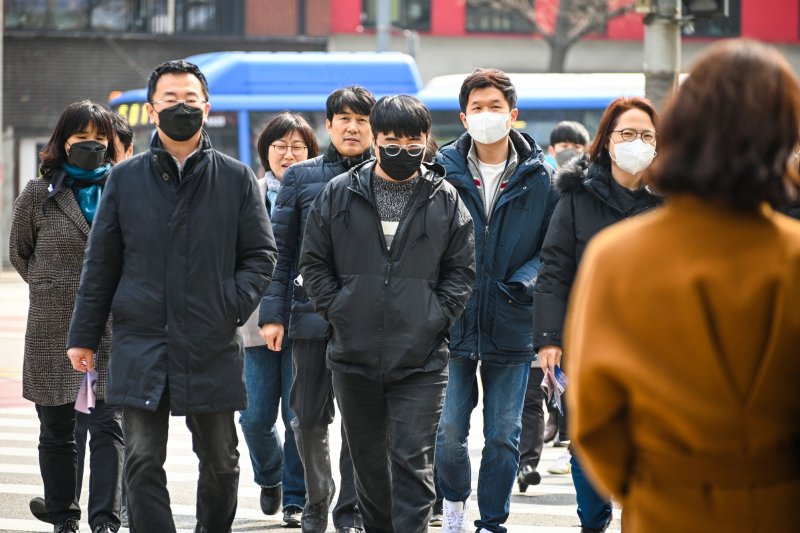While South Korea's rate of new coronavirus infections continues to slow, authorities are worried about new clusters of cases developing. Photo by Thomas Maresca/UPI |
License Photo
SEOUL, March 17 (UPI) -- South Korea reported fewer than 100 new COVID-19 cases for a third day in a row Tuesday as health authorities are focusing on the threat of new clusters, with churches emerging as a point of concern.
"The [Korea Centers for Disease Control and Prevention] is witnessing a decrease in confirmed cases," Vice Health Minister Kim Gang-lip said at a briefing Tuesday. "However, we believe this is a critical time as we are seeing sporadic outbreaks at religious facilities, nursing homes and other small facilities."
Fifty-one coronavirus cases connected to the River of Grace Church in Seongnam, Gyeonggi Province, have been confirmed, the KCDC announced Tuesday. More than two dozen other cases have been tied to a separate pair of churches in the province, which neighbors Seoul.
One factor in the spread of infections at the River of Grace Church was a misguided belief that a saltwater spray would help protect against the coronavirus.
"This outbreak at the church in Seongnam happened because there was a mass gathering inside a very limited place, and they also had the misinformation of spraying saltwater in their mouths in order to be sanitized," Kim said.
The vice health minister added that officials were concluding an investigation of all members who attended Sunday services at the church on March 1 and 8 and warned that the number of confirmed cases could rise.
Kim urged groups to refrain from gathering indoors in closed spaces and also cautioned against the spread of false information.
"Through the internet and [social networking services] we are seeing a spread of fake information and fake news," Kim said. "Please do not rely on them but trust the information that [health authorities] disclose."
Gyeonggi Province on Tuesday issued an executive order restricting religious services until March 29. Churchgoers must wear masks, be screened for high temperatures and stay at least six feet apart during services, Gov. Kim Hee-gyeom announced at a press briefing.
"We have asked the religious community to voluntarily refrain from services to prevent infections, but infectious diseases continue to spread through religious gatherings," Kim said. "Therefore, we are issuing an executive order to limit the rallies by non-compliant churches."
Kim said that 137 churches on Sunday did not follow recommended coronavirus safety regulations.
Churches that fail to follow the new executive order can be closed and fined more than $2,400, Kim said.
Confirmed cases connected to a call center in Seoul rose to 134 on Monday, the KCDC announced, in another cluster that is keeping authorities concerned.
The total number of COVID-19 cases stands at 8,320 in South Korea. Over 87 percent of cases are concentrated in the southeastern city of Daegu and neighboring North Gyeongsang Province, with around 60 percent connected to a single religious sect, the Shincheonji Church of Jesus, according to the KCDC.
There were 84 new cases reported on Tuesday, with 44 occurring in the Seoul metropolitan area and 37 in Daegu and North Gyeongsang. It was the first time since South Korea's widespread coronavirus outbreak began a month ago that the daily cases from the Seoul area exceeded those from Daegu.
On Tuesday, South Korean President Moon Jae-in vowed to take stronger measures to combat the economic impact of the coronavirus, calling the situation "even more serious than the 2008 global financial crisis."
"It is a complex crisis, where daily social activities, as well as production and consumption, are paralyzed, supply and demand are rapidly contracting, and both the real economy and the financial markets are being hit simultaneously," Moon said at a cabinet meeting
South Korean shares have been plunging over the last month, with the KOSPI composite index hitting its lowest point in nearly a decade in Tuesday's trading, falling by 2.47 percent despite an unexpected rate cut from the Bank of Korea on Monday.
Moon announced that the government will be forming an emergency economic council, saying the group will "promptly and boldly come up with special economic measures." The government has unveiled a nearly $10 billion special budget to fight the coronavirus, and on Tuesday Moon said that additional stimulus would be considered.
In another measure to slow the spread of the highly infectious respiratory disease, South Korea announced on Tuesday that schools and day care centers would remain closed until April 6, pushing opening dates back by an additional two weeks. Health officials also announced increased screening procedures for international arrivals at airports.
South Korea's fatality rate for COVID-19 cases remains relatively low, with a total of 81 deaths confirmed on Tuesday after six new cases were reported. The number of recovered patients rose by 264 to 1,401, the KCDC announced.
A health worker with the Israeli national emergency service, Magen David Adam, wears protective gear while taking swabs to test for COVID-19 at a drive-through testing center in East Jerusalem on August 26. Photo by Debbie Hill/UPI |
License Photo
















